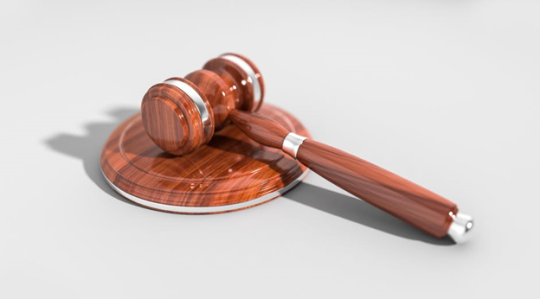
A
Federal Appeals Court in New York recently concluded that Title VII of the 1964
Civil Rights Act protects workers from bias based on their sexual orientation.
The Civil Right Act prohibits workplace bias specifically about “race,
color, religion, sex, or national origin.” The Equal Employment
Opportunity Commission (EEOC), which is the federal body in charge of Title VII
enforcement, agrees with the decision made by the court. This case will most
likely be taken up with the Supreme Court. In this case, the EEOC and
Department of Justice will have to follow the Court’s interpretation of the
term “sex discrimination”. In the
following article, posted by the New York Times, Alan Feuer and Benjamin Weiser
write about a recent ruling.
“In a case that could have wide-ranging
national significance for gay rights, a federal appeals court in New York ruled
on Monday that a landmark civil rights law bars employers from discriminating
against their workers based on sexual orientation.The decision was a setback for the Justice
Department, which under President Trump had unexpectedly interceded in a
discrimination lawsuit filed by a sky-diving instructor. The department had
argued that Title VII of the 1964 Civil Rights Act did not explicitly cover
sexual-orientation discrimination in the workplace, a stance that put it at
odds with another federal body, the Equal Employment Opportunity Commission.In rejecting the Justice Department’s
argument, the United States Court of Appeals for the Second Circuit became the
second appeals court to rule recently that the Civil Rights Act, which outlaws
bias in the workplace on the basis of “race, color, religion, sex or national
origin,” should also be extended to include sexual orientation. A third
appellate court in Atlanta has ruled differently.While gay rights groups hailed the decision
on Monday, the ruling could create a scenario in which the issue of gay rights
at work will be decided by a Supreme Court that already bears Mr. Trump’s
imprint, with his nomination of Justice Neil M. Gorsuch.Altitude Express, the private party that lost
the case on Monday, said it had not decided whether it would ask the Supreme
Court to review the decision.The 10-3 ruling by the Second Circuit stemmed
from Altitude Express’s dismissal of a Long Island sky-diving instructor,
Donald Zarda, in 2010. As Mr. Zarda was preparing that year for a tandem sky-dive
with a female student, he told her that he was “100 percent gay.” Her boyfriend
later complained to the school about the comment.Mr. Zarda said he had made the remark to
soothe the woman, who seemed uncomfortable with being so tightly strapped to him
during the dive. Mr. Zarda filed a lawsuit, eventually claiming that his firing
violated Title VII. Two courts in New York, including a three-judge panel of
the Second Circuit, initially ruled against him.In 2014, Mr. Zarda died in a sky-diving
accident. His appeal, however, continued, and the legal landscape started
changing. The E.E.O.C., under President Barack Obama, issued a ruling in a
separate matter, finding for the first time that “sexual orientation is
inherently a ‘sex-based consideration’” and should be protected by the law.In July, the Trump administration decided to
weigh in on the Zarda case. On the same day that Mr. Trump suggested on Twitter
that transgender people would be barred from serving in the military, Justice
Department lawyers filed a friend of the court brief in Mr.
Zarda’s case, arguing that Title VII protections did not extend to sexual
orientation.In its brief, the Justice Department said
that the E.E.O.C. was “not speaking for the United States.”The Justice Department’s intervention in Mr.
Zarda’s case led to sharp criticism from groups like the American Civil
Liberties Union, which called the brief aThe Second Circuit’s ruling on Monday
rejected the Justice Department’s position.In a majority opinion joined at least in part
by eight other judges, Chief Judge Robert A. Katzmann wrote, “Since 1964, the
legal framework for evaluating Title VII claims has evolved substantially,”
adding that it now included expanded protections against discrimination based
on factors like “sex stereotypes.” The opinion said that the law should be read
to include sexual orientation.“Sexual orientation discrimination is a
subset of sex discrimination because sexual orientation is defined by one’s sex
in relation to the sex of those to whom one is attracted,” Judge Katzmann
wrote, “making it impossible for an employer to discriminate on the basis of
sexual orientation without taking sex into account.”Bottom of Form
A 10th judge, José A. Cabranes, agreed with
the outcome, but not Judge Katzmann’s reasoning. The appeals court rarely
issues decisions through what is known as the en-banc court, in which all
eligible judges participate. Typically, it issues decisions through three-judge
panels.Judge Gerard E. Lynch, one of the dissenting
judges, said in an opinion that he came to his decision “regretfully,” but that
Congress had not included sexual orientation on its list of grounds to outlaw
bias in the workplace.“When interpreting an act of Congress,” Judge
Lynch wrote, “we need to respect the choices made by Congress about which
social problems to address, and how to address them.” Many states, he noted,
had “recognized the injustice of discrimination on the basis of sexual
orientation.”“I hope that one day soon Congress will join
them, and adopt that principle on a national basis,” he wrote. “But it has not done
so yet.”Justice Department officials have previously
said that Congress, and not the courts, should decide who is protected under
the law.Following the ruling on Monday, Devin
O’Malley, a Justice Department spokesman, adhered to that message, saying that
while the department was “committed to protecting the civil and constitutional
rights of all individuals,” it was also “committed to the fundamental principle
that the courts cannot expand the law beyond what Congress has provided.”In the past year or so, two separate federal
appeals courts have issued conflicting rulings on Title VII. Last March, a
divided three-judge panel of the 11th Circuit Court of Appeals in Atlanta ruled
that Title VII’s reference to sex did not encompass discrimination based on
sexual orientation. One month later, however, the Seventh Circuit in Chicago,
by an 8-to-3 vote, held that bias based on sexual orientation was in fact “a
form of sex discrimination.”In December, the Supreme Court denied a request to hear an appeal
filed by the plaintiff in the Atlanta case. But with Monday’s ruling
essentially in line with the finding by the Seventh Circuit in Chicago, the
appeals courts’ varying viewpoints may be enough to prompt Supreme Court
review.Saul Zabell, the lawyer for Altitude Express,
said he was pleased that the ruling fixed “a glaring legislative gap in
fundamental human rights,” but added that he was also “disappointed that the
panel chose to ignore the facts of underlying matter” and “exceeded their
judicial mandate.”In a brief statement, Eric T. Schneiderman,
the New York State attorney general, who filed an amicus brief in the case,
said on Monday: “No one should face discrimination because of their sexual
orientation — and I am pleased that the Second Circuit has sent a clear
statement in support of equal justice today.”Bill Moore, a co-executor of Mr. Zarda’s
estate, also praised the ruling.“Today’s victory is a wonderful step forward
for the country as a growing number of Americans take a stand against
anti-L.G.B.T.Q. employment discrimination,” Mr. Moore said in a statement. “I
wish Don were here to see how he and his case have advanced the movement for
L.G.B.T.Q. equality.””
Here at Converge HR Solutions, we provide your company
with a premier HR team that takes care of all your HR Outsourcing, Recruiting, and
Consulting needs. With new and changing laws and regulation, it is important to
stay up to date and Converge HR Solutions is here to help. If you would
like to learn more about what products and services Converge HR Solutions can
offer you, please visit our website at https://convergehrsolutions.com/ or contact us directly by email at info@convergehrsolutions.com or phone at 610-296-8550
Article
source: https://www.nytimes.com/2018/02/26/nyregion/gender-discrimination-civil-rights-lawsuit-zarda.html
Image
Source: www.pexels.com


0 Comments